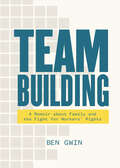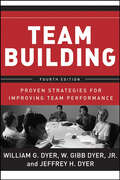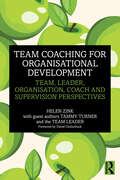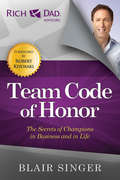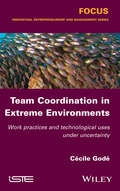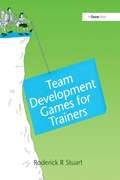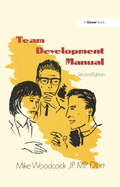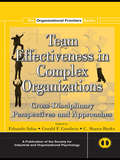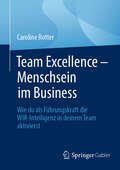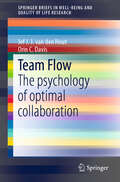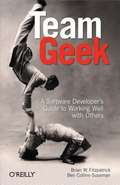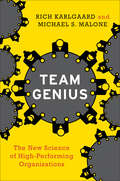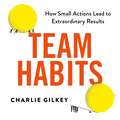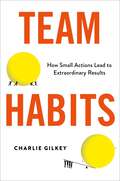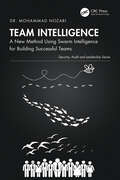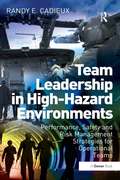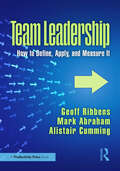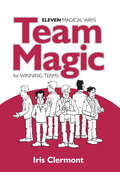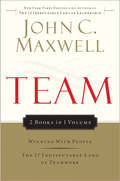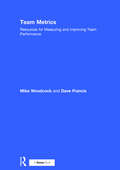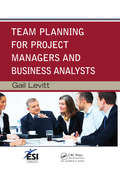- Table View
- List View
Team Building: A Memoir about Family and the Fight for Workers' Rights
by Ben GwinAn &“engaging&” firsthand account of the organizing effort inside one of the world&’s largest tech companies—and its impact on one Pittsburgh family (Booklist). In 2019, Ben Gwin played an integral role in organizing the contract workers at Google&’s Pittsburgh offices. In Team Building, he takes us inside the employees&’ fight for better benefits and more flexible scheduling, offering us a candid account of today&’s labor movement and the forces in America that aim to divide workers and maintain the status quo. But this is also a personal story of struggle and triumph. As Ben works with the union, he&’s suddenly faced with the prospect of raising his teenage daughter alone after her mother dies of a drug overdose. As he juggles work and the challenges of single fatherhood, he offers us a frank portrait of daily American life, where it sometimes feels like every moment is an uphill battle. Expertly crafted and tightly structured, Team Building artfully explores the ways our working conditions reach deeply into our lives outside the office. It&’s an honest and ultimately hopeful look at the importance of building solid foundations with the teams that matter most. &“Depict[s] the many ways unfair work policies can impact employee lives.&” —Kirkus Reviews &“This engaging memoir goes beyond detailing a period in Gwin&’s life, also offering a forthright take on the frustrations of the contract worker. It&’s an essential piece for understanding the fight for labor rights. Gwin&’s resolve shines through in this moving tale.&” —Booklist
Team Building: Proven Strategies for Improving Team Performance
by Jeffrey H. Dyer William G. Dyer W. Gibb DyerThis book is filled with the concepts, ideas, and practical suggestions that are needed for any manager to have at hand if he or she is a member or creator of a committee, team, task-force, or any other activity involving collaboration among several people. The ideas are proven by several decades of experience and well-supported in the text with numerous examples.
Team Coaching for Organisational Development: Team, Leader, Organisation, Coach and Supervision Perspectives
by Helen ZinkWorking with teams, leading teams and being a member of a team is part of everyday working life for most of us. Through the lens of a team coaching case study, this book considers the development journey of a team and system influences over a three-year period. Readers are invited to walk in the shoes of the team, the team leader, the organisation, the team coach and the coach’s supervision and support networks, providing a unique insight into team coaching and development that goes beyond the traditional focus on the coach’s perspective. Helen Zink uses her considerable experience as a leadership and team growth coach, and leader to illustrate how team coaching interventions can be combined with other disciplines such as positive psychology, change management and strategic implementation in effective ways. The book takes a pracademic approach, showing how theories, models and best practice are applied to a real case and highlighting both the successes and challenges experienced to offer an example for all those involved in team, leadership and organisational development. With it widely recognised that collective leadership and teamwork is needed to deal with the rapidly changing environment organisations find themselves in, this is a timely and important resource for coaches, team coaches, coach supervisors, team leaders, team members, organisational development specialists, change managers, academics and consultants.
Team Code of Honor
by Blair SingerEvery great team, culture, society, religion or business that has endured time, adversity and challenge has always had one thing in common: a set of simple but powerful rules that govern the internal behaviors and expectations of that group. It is called The Code of Honor. We hear of these Codes when we think of things like The Ten Commandments, the Marine Corps or the Constitution. Yet if sales is the number one skill in business, number two has to be the ability to bring ordinary people together to build a championship team. This does not happen by chance or by the simple accumulation of talent. The Code is the core ingredient to creating winning organizations. The book is a step-by-step guide for any individual, group or company to actually create a Code of Honor specific to their team. The Rich Dad Poor Dad Advisor series was designed as a "how-to" series to empower individuals to succeed in the world of business and finance. "Team Code of Honor" is critical to this series because its processes bridge all facets of business, investment, entrepreneurship and even personal life. The book explains through graphic examples, stories and numerous case studies how a Code or set of rules is created, maintained, enforced and used for rapid and controlled growth of any entity.The book is designed as an operating manual for putting any business team together. It steps you all the way from properly choosing players, to creating the Code, to increasing performance and to winning. Each chapter gives the team specific assignments and examples so that by the time you have completed the book, your Code is in place and your team is operating at a true championship level.
Team Concepts: Understand These First
by Harvard Business Review PressThe word "team" implies unity of purpose, collaboration, and. to some, a measure of equity. Working as a team offers some advantages, including a unified effort to achieve common goals and a new way for individuals to interact with one another. This chapter examines these advantages, and some disadvantages as well, and provides tools for determining whether a team effort is appropriate.
Team Coordination in Extreme Environments
by Cécile GodéThe development and coordination of managerial devices to help businesses cope with the numerous challenges they face have been the subject of many empirical analyses in recent years. This books draws from these studies to answer the question of how to coordinate a team in extreme environments. Embracing a practice-based perspective, it identifies work practices and technological uses that improve coordination within teams. Organizations need to know how to support the coordination of teams that evolve in highly changing, uncertain and risky contexts. Beyond reviewing current literature on the analysis of coordination in the field, the author draws on military case studies and illustrations to offer readers practical ways to implement devices that facilitate coordination within teams.
Team Development Games for Trainers
by Roderick R. StuartIf you’re involved in designing or delivering interpersonal skills training you will know that there are two perennial problems. The first is finding material that matches your objectives. The second is finding material that will be unfamiliar to the participants. The 59 games in Roderick Stuart’s collection have not appeared in print before. Based on the author’s experience with a wide range of organizations and participants, they cover the entire gamut of skills associated with team development, including assertiveness, communication, creativity, decision making, influencing, listening, planning, problem solving and time management. Each game is presented in a standard format, with an indication of objectives, timing and group size, detailed step-by-step guidance for the trainer or team leader, and ready-to-copy masters for all participants’ material. An index of objectives makes it easy to select the most suitable items for your training needs and to compile complete workshops or more extensive programmes. In addition the author provides a four-stage model that relates learning to the requirements of the workplace, and a set of checklists for facilitating the learning process.
Team Development Manual
by Mike WoodcockIn the modern organization most tasks are accomplished by teams. This bestselling manual brings together basic theory, a diagnostic instrument, descriptions of the key elements of effective teamwork and a detailed guide to sources of further information to help, both in the UK and overseas. A particularly valuable feature is the ’building blocks’ questionnaire that allows the manager or trainer to identify specific weaknesses in his or her team and to decide an appropriate action for overcoming them. The companion volume 50 Activities for Teambuilding provides a unique collection of structured experiences for use with the manual. With its practical, down-to-earth approach, Team Development Manual will appeal to managers in every type of organization, as well as to personnel and training specialists and advisers - in short, to everyone with an interest in improving the way people work together.
Team Effectiveness In Complex Organizations: Cross-Disciplinary Perspectives and Approaches (SIOP Organizational Frontiers Series)
by Eduardo Salas C. Shawn Burke Gerald F. GoodwinOver the past 40 years, there has been a growing trend toward the utilization of teams for accomplishing work in organizations. Project teams, self-managed work teams and top management teams, among others have become a regular element in the corporation or military. This volume is intended to provide an overview of the current state of the art research on team effectiveness.
Team Excellence – Menschsein im Business: Wie du als Führungskraft die WIR-Intelligenz in deinem Team aktivierst
by Caroline RotterDieses Fachbuch zeigt dir, wie du als Führungskraft durch zahlreiche Möglichkeiten der Teamentwicklung eine erfolgreiche Zusammenarbeit in (hybriden) Teams förderst: raus aus der Überforderung hinein in eine freudvolle Zusammenarbeit, die den Team-Spirit und die Superkräfte aller Teammitglieder aktiviert. Der Schlüssel dazu: Menschlichkeit in der Arbeitswelt und eine Zusammenarbeit geprägt von Vertrauen, Offenheit, Selbstverantwortung und Wertschätzung. So kann es gelingen, dass sich alle Mitarbeitenden mit ihren Stärken einbringen und sich ein echtes High-Performing-Team entwickelt. Das Buch richtet sich vor allem an Teamleiter:innen und Projektleiter:innen, die ihre Teams durch herausfordernde Zeiten begleiten. Persönliche Erfahrungsberichte der Autorin geben einen Einblick in die Praxis. Selbstreflexionsaufgaben helfen dir dabei, dich und dein eigenes Team besser einzuschätzen und die konkreten Handlungsempfehlungen der Autorin lassen sich schnell in der eigenen Führungsarbeit einsetzen. Der Inhalt Die natürliche Kraft in Teams Selbstverantwortung = Superpowers Gestaltungsfreude aktivieren Freiraum und Offenheit, Wertschätzung und Respekt, Feiern und Reflektieren Golden Rules für dich und dein Team Führung ist Selbstführung
Team Flow: The psychology of optimal collaboration (SpringerBriefs in Well-Being and Quality of Life Research)
by Jef J.J. van den Hout Orin C. DavisThis book presents a series of studies that conceptualize, test, and monitor team flow experiences in professional organizations to perform autonomously and successfully. It analyses the processes by which team flow emerges by exemplifying case studies, and introduces a protocol to spark team flow in professional organizations.
Team Geek
by Ben Collins-Sussman Brian W. FitzpatrickIn a perfect world, software engineers who produce the best code are the most successful. But in our perfectly messy world, success also depends on how you work with people to get your job done. In this highly entertaining book, Brian Fitzpatrick and Ben Collins-Sussman cover basic patterns and anti-patterns for working with other people, teams, and users while trying to develop software. This is valuable information from two respected software engineers whose popular series of talks--including "Working with Poisonous People"--has attracted hundreds of thousands of followers. Writing software is a team sport, and human factors have as much influence on the outcome as technical factors. Even if you've spent decades learning the technical side of programming, this book teaches you about the often-overlooked human component. By learning to collaborate and investing in the "soft skills" of software engineering, you can have a much greater impact for the same amount of effort.
Team Genius
by Michael S. Malone Rich KarlgaardA groundbreaking book that sheds new light on the vital importance of teams as the fundamental unit of organization and competition in the global economy.Teams--we depend on them for both our professional success and our personal happiness. But isn't it odd how little scrutiny we give them? The teams that make up our lives are created mostly by luck, happenstance, or circumstance--but rarely by design. In trivial matters--say, a bowling team, the leadership of a neighborhood group, or a holiday party committee--success by serendipity is already risky enough. But when it comes to actions by fast-moving start-ups, major corporations, nonprofit institutions, and governments, leaving things to chance can be downright dangerous.Offering vivid reports of the latest scientific research, compelling case studies, and great storytelling, Team Genius shows managers and executives that the planning, design, and management of great teams no longer have to be a black art. It explores solutions to essential questions that could spell the difference between success and obsolescence. Do you know how to reorganize your subpar teams to turn them into top performers? Can you identify which of the top-performing teams in your company are reaching the end of their life span? Do you have the courage to shut them down? Do you know how to create a replacement team that will be just as effective--without losing time or damaging morale? And, most important, are your teams the right size for the job?Throughout, Rich Karlgaard and Michael S. Malone share insights and real-life examples gleaned from their careers as journalists, analysts, investors, and globetrotting entrepreneurs, meeting successful teams and team leaders to reveal some "new truths": The right team size is usually one fewer person than what managers think they need. The greatest question facing good teams is not how to succeed, but how to die. Good "chemistry" often makes for the least effective teams. Cognitive diversity yields the highest performance gains--but only if you understand what it is. How to find the "bliss point" in team intimacy--and become three times more productive. How to identify destructive team members before they do harm. Why small teams are 40 percent more likely to create a successful breakthrough than a solo genius is. Why groups of 7 (± 2), 150, and 1,500 are magic sizes for teams.Eye-opening, grounded, and essential, Team Genius is the next big idea to revolutionize business.
Team Habits: How Small Actions Lead to Extraordinary Results
by Charlie GilkeyWe all know how important our habits are for personal productivity, success and happiness. But the truth is that we rarely work alone: reaching our goals depends on how effectively we work with others, and teams have their own habits that can help - or hinder - success.Here, productivity and teamwork expert Charlie Gilkey shows how to cultivate, implement and maintain the small habits that lead to big results for any team. No matter our job title or role, we all influence the people we work with, and the culture that we create: how we schedule meetings is a team habit, as is the way we cc, bcc or Slackeach other, communicate our availability, set our boundaries and structure our days.They can make the difference between teamwork that feels like a struggle, and collaboration that empowers everyone to deliver their best. Starting with the Team Habits Quiz, and full of clear, applicable takeaways oneverything from communication to morale to creating a sense of belonging, this book is essential reading for anyone who works in a team and wants to get further, together.
Team Habits: How Small Actions Lead to Extraordinary Results
by Charlie GilkeyDISCOVER SMALL, TEAM-BASED CHANGES THAT HAVE COMPANY-WIDE RESULTS. The teams we work in amplify our individual efforts, yet we constantly struggle to accomplish what is possible. You can see all the problems in a typical weekly meeting. No planning. Missing goals. Muddled communication. We think just bringing our personal hopes and desires will be enough. It&’s not. The groups we work in need collective habits as much as individuals need better personal habits. Determining team habits for things like planning, decision-making, and prioritization produce reliability and ease for everyone. Team habits create better work and let people work better together. In Team Habits, Charlie Gilkey explains how the revolution in personal habits has an even greater potential when applied to teams. With practical exercises, a Team Habits Quiz to evaluate areas for improvement, and a guide to create a team habits roadmap, Team Habits will help you transform your group so team members can flourish and thrive. If changing the smallest habit can yield powerful results for an individual, then just imagine what it can do for your team.
Team Intelligence: A New Method Using Swarm Intelligence for Building Successful Teams (Security, Audit and Leadership Series)
by Mohammad NozariIf you have wondered about mesmerizing patterns of flying birds and fish, and asked how they do it, then you have observed what biologists refer to as an intelligent swarm. It is as if the members of swarm are receiving commands on what to do. It is magic! In reality, it is an intriguing set of behaviors that many species including birds, fish, bats, wolves, honeybees, termites and many others have learnt during their millions of years of evolution, which has enabled them to succeed better and sustain their lives. We have learned and applied our learning from nature, and have been inspired to invent many things we use from this fabulous source: Mother Nature! The question that led to long research and this book is set to answer, might be strange and unique: Can we use nature for managing people and teams in companies? After all, social beings in nature seem to be able function very well, and recent research has revealed great approaches they take to make decisions, and work together. This book opens that exact interdisciplinary field, a bridge between managing teams and people in companies with how similar problems are solved in intelligent swarms. The research supporting this idea has led to a set of principles that will transform traditional teams into Intelligent Teams. These teams are capable of bringing performance, learning, and happiness of the team members to a new high level.
Team Leadership in High-Hazard Environments: Performance, Safety and Risk Management Strategies for Operational Teams
by Randy E. CadieuxSafety performance is a complicated issue, particularly in high-hazard environments, where time and other constraints can be amplified, and result in numerous impacts. From an organizational and business perspective, safety and production/performance are often seen as competing goals. When production is increased, safety defenses and barriers frequently decrease, and when programs are developed in an effort to improve safety, employees may be unable to meet production goals within the safety constraints. Team Leadership in High-Hazard Environments recognizes these difficulties and constraints and proposes an approach to safety leadership in which safety and organizational performance are inextricably linked; one that addresses safety from both the systems and human factors perspectives. To that end, Randy Cadieux introduces the nine essential components to team leadership. By studying these areas and using the information in each chapter, organizational leaders, managers, and supervisors will gain an understanding of key factors that will help them design, develop, and implement team training programs that improve the way employees work together and the way they mitigate hazards. Additionally, the book describes how work systems and work environments may be designed or shaped so that teams are placed in a position to do their optimal work, maximizing the potential for human and team performance. This is an important book that draws on techniques and models developed from Crew Resource Management, human factors, risk management, as well as more traditional HR management disciplines.
Team Leadership: How to Define, Apply, and Measure It
by Geoff Ribbens Mark Abraham Alistair CummingA small group of experienced business leaders and academics have teamed up to create an innovative and potentially disruptive approach to developing leadership in the 21st century. The result is a unique, people-centric, and scientifically researched theory of leadership linked to an accurate data-based assessment and diagnostic product. This is the result of several years of study and development as well as many years of curiosity and experience. This is a new approach to leadership development. The authors use a combination of leadership experience, research, and science to move away from unprovable theory and subjective judgment to deliver a definable product with unlimited application. For individual leaders looking to maximise personal development and results or for organisations wanting to analyse leadership and its effects across an entire structure or business, this book will redefine understanding and development. The work has proved that team members’ perceptions of a leader and leadership behaviours will define their motivation, willingness, loyalty, output, and mental health far more than the actual leadership behaviours themselves. The authors’ application of Emergent Team Leadership Theory, why and to what degree team members attribute leadership to their leaders, directors, or managers, leads to accurate assessments of how leaders and leadership are viewed in teams, businesses, and organisations. Importantly, the work is so accurate that individual leaders can define precisely where to focus their personal development to get the most from themselves and their teams. Even for leaders and managers of the same grade in the same role, personal leadership development and training will be different. This work has developed the Leadership Pathway Audit™ that measures the effectiveness of leadership for any leader or any team and will, over time, chart how leadership changes as any factor of the leader, the team, or the situation changes. Each leader, director, or manager gets a unique representation of the perception of their leadership at any time and a detailed report on the data and perceptions behind this representation. There are limitless options for following this with bespoke analysis of an individual’s leadership and for personal development programs tailored to their profile and organisation. Equally, reviewing the entirety of a business or organisation’s leadership profiles gives an incredibly accurate view of leadership across an entire company organisation, or sector.
Team Magic: Eleven Magical Ways for Winning Teams
by Iris ClermontThis book is written for managers, for team leaders and for team members who are open minded and want to change their habits and be a part of or lead the 'Best', 'Dream' or 'Magic' Team. With just a few tips to exercise and to pay attention to, teams can work together much better. Become a highly effective, successful team member or team leader, working in a creative and relaxed company atmosphere, with a balanced work and private life.
Team Management Challenges: Where Leaders Matter
by Harvard Business Review PressRecognizing management and leadership challenges is key to creating an effective team. This chapter examines the role of the leader, and that of team identity, and how to manage these distinct identities in the context of team dynamics.
Team Maxwell 2in1 (Winning With People/17 Indisputable Laws)
by John C. MaxwellWinning With People and 17 Indisputable Laws is authored by John C. Maxwell and bundled into a 2-in-1 collection.
Team Metrics: Resources for Measuring and Improving Team Performance
by Mike WoodcockMike Woodcock and Dave Francis are two of the most influential writers and designers of materials for team development of the last 30 years. This collection of Team Metrics brings together some of their very best material for measuring aspects of team performance. The collection includes a variety of audits, questionnaires and surveys, which can be used in a training environment or as real-time team interventions. The 27 items in the collection cover team and team leader skills, team development, team motivation, team roles, team culture, climate and communication, making this a must-have collection of team development materials for trainers, facilitators and team leaders. A CD is supplied with every manual which provides a Powerpoint slide presentation for each of the 27 metrics.
Team New Zealand (A)
by Marco IansitiThe case describes the development process used by Team New Zealand to design their two yachts for the 1995 America's Cup. During development, the team makes extensive use of simulation and physical prototyping to improve the initial design concept. As they approach construction, they must decide whether to build both boats at the same time and, if so, whether to vary their designs. The decision hinges on evaluating the benefits of different experimentation strategies. Includes color exhibits.
Team Planning for Project Managers and Business Analysts (Esi International Project Management Ser. #13)
by Gail LevittSupplying busy project professionals with time-tested tips and templates for developing teams efficiently and effectively, Team Planning for Project Managers and Business Analysts provides the planning materials required to increase team collaboration and productivity in a global workplace.This comprehensive resource offers insights and access to c
